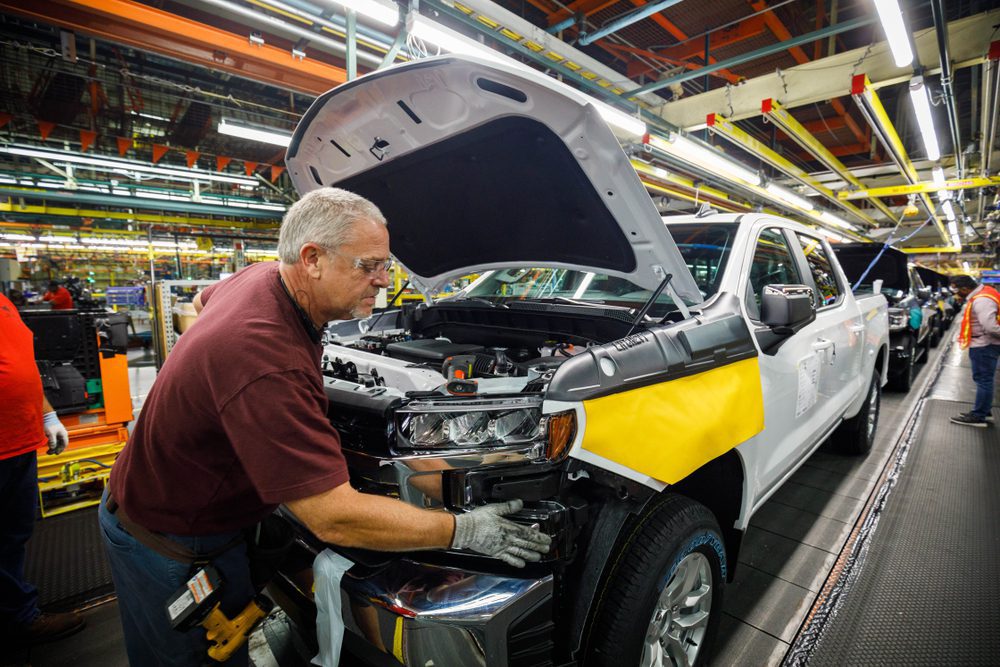As of next week, General Motors will be pausing production lines for nearly all full-size pickup trucks manufactured in the US and Mexico. The shutdowns are related to the microprocessor chip shortage, as have nearly all the latest auto industry shutdowns. GM sent its affected union members a notice that, starting Monday the plants would be idled partially or in full until Aug 2. The Flint Assembly plant will operate just one shift for the week where full-size HD Sierra and Silverado trucks are built. For the Fort Wayne Assembly Plant in Indiana and the Silao Assembly plant in Mexico, production will be idled fully, and Aug 2 is the expected date to resume regular production. GM spokesman David Barnas said in a statement, “These most recent scheduling adjustments are being driven by temporary parts shortages caused by semiconductor supply constraints from international markets experiencing COVID-19-related restrictions. We expect it to be a near-term issue.” Trucks are certainly not the only models for GM affected by the chip shortage at the moment. Less than a week ago, GM announced that four midsize SUV plants in North America would be idled for two weeks starting this past Monday. Certain shutdowns coincided well with scheduled summer breaks, but the CAMI Assembly plant in Ontario, CA that produces the Equinox model has been extended another two weeks, expecting to resume production on Aug 16.
In his statement, Barnas remarked, “The global semiconductor shortage remains complex and very fluid, but GM’s global purchasing and supply chain, engineering and manufacturing teams continue to find creative solutions and make strides working with the supply base to minimize the impact to our highest-demand and capacity-constrained vehicles, including full-size trucks and SUVs for our customers.” The focus squarely on producing the most popular and high-profit models like trucks and SUVs, yet it’s those central models that are now being heavily affected. It’s a signal of how concentrated the shortage is becoming.
Shortage to drag into 2022, but less severe
It appears carmakers are in the worst of it right now, although chip production is slowly building to meet the incredible demand in the manufacturing sectors. At an Automotive Press Association event in Detroit on July 21, Stellantis CEO Carlos Tavares said, “The semiconductor crisis, from everything I see and I’m not sure I can see everything, is going to drag into ’22 easy because I don’t see enough signs that additional production from the Asian sourcing points is going to come to the West in the near future.” Some carmakers have dropped features from models being built. GM, for example, has eliminated the automatic stop-start feature from some vehicles due to the shortage and is now trimming wireless charging as an option on certain vehicles. Tens of thousands of vehicles have been ‘built shy’, meaning they are assembled but missing components requiring microchips that can be quickly finished once they arrive. Tavares added that re-engineering a vehicle around the missing chips can take around 18 months due to the “sophistication of the technology involved”. Daimler’s CFO Harald Wilhelm also sees the shortage dragging into 2022, but less severe than in H2 2021. However, he indicated that the company was closely watching the prices of steel, copper, and aluminum through the rest of this year as their costs are climbing.
Did you enjoy this article from Jason Unrau? Please share your thoughts, comments, or questions regarding this topic by submitting a letter to the editor here, or connect with us at newsroom@cbtnews.com.
Be sure to follow us on Facebook and Twitter to stay up to date or catch-up on all of our podcasts on demand.
While you’re here, don’t forget to subscribe to our email newsletter for all the latest auto industry news from CBT News.










